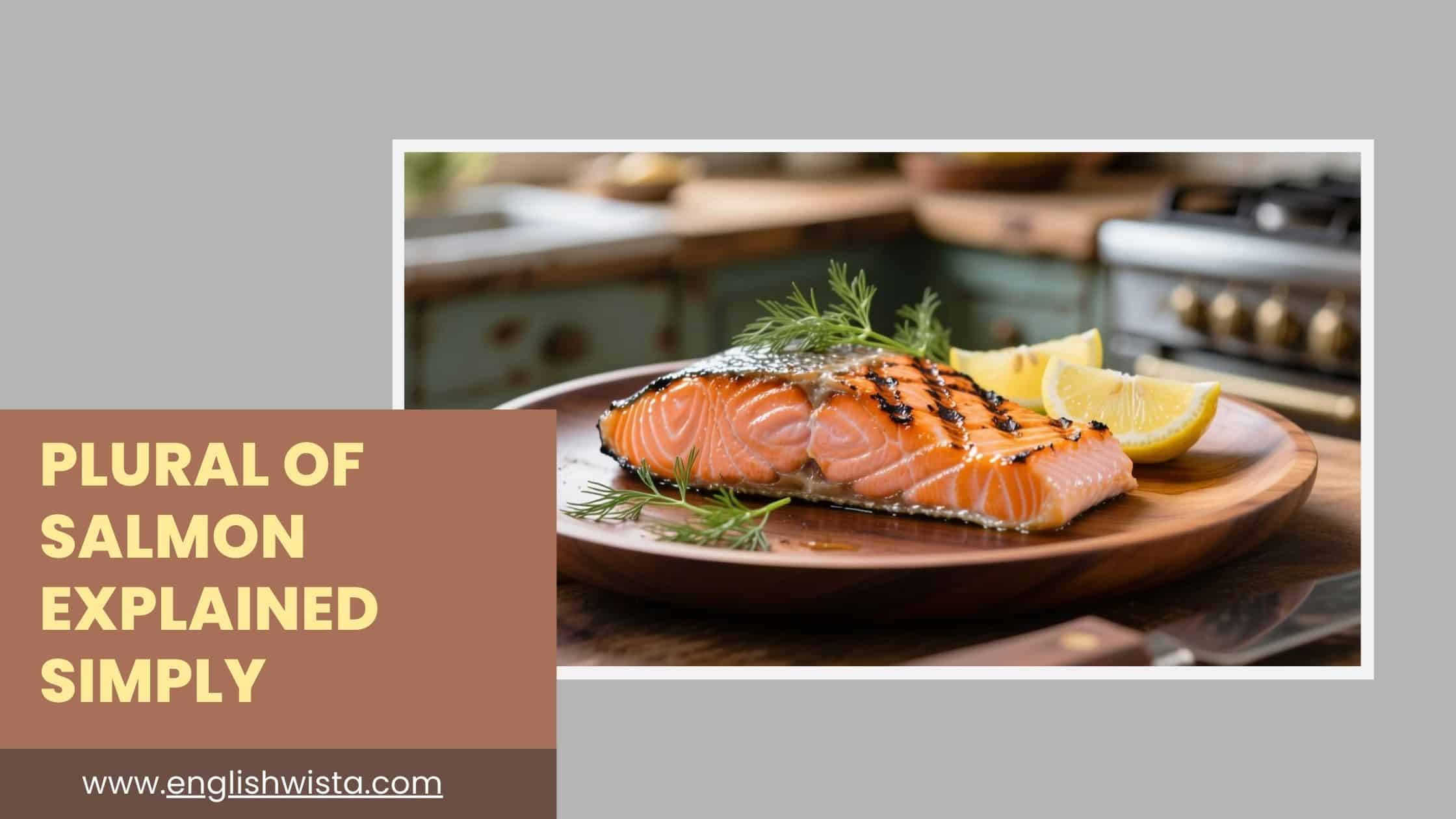Have you ever sat at a restaurant, looked at the menu, and wondered, “If I order more than one salmon, do I say ‘salmons’ or just ‘salmon’?” You’re not alone. This is a very common question, and it’s a little tricky because English has many unusual rules when it comes to plurals. Some words follow the standard pattern, while others take on a form that looks nothing like the original word. And then there are words like salmon, which don’t change at all in the plural form.
In this article, we’re going to explore the plural of salmon in a step-by-step, beginner-friendly way. We’ll look at the word itself, explain why it behaves the way it does, and give you lots of real-life examples so you can use it with confidence. Along the way, we’ll also throw in some fun facts about salmon the fish, the word’s origin, and even a few surprising grammar tidbits.
So grab a cup of tea, sit back, and let’s dive in!
What is the plural of salmon?
The quick and simple answer is this:
The plural of salmon is salmon.
Yes, that’s right. The word does not change whether you are talking about one fish or many fish.
- One salmon
- Two salmon
- Ten salmon
- A school of salmon
The word looks and sounds exactly the same in both the singular and the plural.
This is one of those quirks in English that can feel confusing at first, but once you learn it, it’s actually pretty easy to remember.
Why doesn’t salmon change in the plural?
Great question! The reason comes down to the history of the word and how English treats certain animal names.
The word salmon comes from the Latin word salmo, which passed into Old French as saumon and eventually became salmon in English. For hundreds of years, English speakers used it without adding an s at the end when talking about more than one.
Some animal names in English follow this same pattern. For example:
- Deer → one deer, two deer
- Sheep → one sheep, five sheep
- Moose → one moose, three moose
- Salmon → one salmon, many salmon
These words are called zero plurals. A zero plural means the plural form is identical to the singular form.
Is “salmons” ever correct?
Now you might be wondering: Can I ever say salmons with an s at the end?
The short answer: Yes, but rarely.
Most of the time, we use salmon as both singular and plural. But in special cases, when we are talking about different species or types of salmon, the form salmons can be used.
For example:
- “There are several salmons native to the Pacific Ocean.” (Here it means several species of salmon.)
- “Atlantic and Pacific salmons differ in their migration patterns.”
So, if you’re talking about species or varieties, you can use salmons. But in everyday conversation, if you’re just talking about the fish you eat for dinner, stick with salmon.
How to use salmon in sentences
Let’s look at some real-life examples. Notice how the word stays the same, whether singular or plural:
- “I caught a salmon in the river yesterday.” (singular)
- “Fishermen caught three salmon during the morning trip.” (plural)
- “Salmon is a popular choice in sushi restaurants.” (general/singular as a type of food)
- “The bears wait by the stream to catch salmon.” (plural)
Now, a couple with salmons (species meaning):
- “Different salmons are found in the Atlantic and Pacific Oceans.”
- “The biologist studied the life cycle of several salmons.”
These examples should help you get a feel for when to use salmon versus salmons.
Definition of salmon
Let’s pause for a quick, simple definition.
Salmon (noun): A large fish that lives in the ocean but swims back to rivers to lay eggs. It is often eaten as food.
That’s it! Easy and straightforward.
Salmon compared to other animal plurals
It can help to compare salmon with other animals that behave the same way.
- Deer: One deer, many deer.
- Sheep: One sheep, a flock of sheep.
- Moose: One moose, several moose.
- Trout: One trout, many trout.
- Salmon: One salmon, many salmon.
These animals share the same zero plural rule. English seems to like keeping fish and some large animals unchanged in the plural.
Common mistakes learners make
When learning English, it’s normal to assume that every word just needs an s to become plural. But with salmon, that’s not the case.
Here are some mistakes people often make:
- ❌ “I ordered two salmons for dinner.” (Incorrect in most cases.)
- ✅ “I ordered two salmon for dinner.” (Correct.)
- ❌ “The lake is full of salmons.” (Incorrect, unless you’re talking about species.)
- ✅ “The lake is full of salmon.” (Correct.)
The takeaway: If you’re talking about the fish in general, no s.
Fun facts about salmon
Learning about the word is fun, but the fish itself is also fascinating. Here are some cool facts:
- Salmon are famous for their migration. They are born in freshwater rivers, then swim out to the ocean, and later return to the exact river where they were born to lay eggs.
- Bears love salmon and often wait at waterfalls to catch them as they leap upstream.
- Salmon are excellent swimmers and can leap several feet out of the water.
- In English, a group of salmon is often called a run of salmon. Isn’t that a fun phrase?
- The pink-orange color of salmon meat comes from their diet, which includes krill and shrimp.
So, not only is salmon an interesting word, but the fish itself is pretty amazing too.
Origin of the word salmon
Words tell stories, and salmon has quite a journey.
- From Latin: salmo → meaning the fish.
- Into Old French: saumon.
- Borrowed into Middle English: salmon.
Some older spellings even dropped the l sound entirely, and in modern English, the l is silent. So we say “sam-un,” not “sal-mon.”
Knowing this history helps explain why salmon doesn’t follow the regular plural pattern. It carried its special form with it through the centuries.
Quick tips to remember the plural of salmon
Here are a few easy tricks to lock it in your memory:
- Think of deer. If deer doesn’t change in plural, neither does salmon.
- Picture a menu. If you’re ordering salmon dishes, you won’t see “salmons” listed.
- Save ‘salmons’ for science. Only use it if you’re talking about multiple species of salmon.
Repeat these tips to yourself, and you’ll never be unsure again.
Practice time: Spot the correct sentence
Let’s do a mini quiz. Which of these sentences are correct?
- “She grilled three salmons for the party.”
- “Fishermen reported catching dozens of salmon.”
- “Biologists compared the Pacific and Atlantic salmons.”
- “We saw many salmons swimming upstream.”
Answers:
- (1) Incorrect (should be “three salmon”).
- (2) Correct.
- (3) Correct (species use).
- (4) Incorrect (should be “many salmon”).
Why does this matter?
At this point, you might be asking, “Why is this even important?”
Well, here’s why: Knowing the correct plural helps you sound more natural and confident in English. Whether you’re writing an essay, chatting with friends, or ordering food at a restaurant, using words correctly makes communication smoother. And since salmon is both a common food and an interesting animal, it’s a word you’ll likely come across again and again.
Conclusion
So, what have we learned? Let’s sum it up in simple terms:
- The plural of salmon is salmon.
- Use salmon for everyday situations, whether one or many.
- Use salmons only when talking about species or types.
- Remember that it follows the same rule as deer, sheep, and trout.
The good news is, once you know this rule, it’s one less thing to worry about. You’ll never be stuck wondering at a dinner table again.
Next time you hear someone ask, “What’s the plural of salmon?” you’ll have the answer ready: “It’s salmon. Easy!”
And who knows you might even impress your friends with the fun fact about zero plurals.
So, the next time you enjoy a delicious salmon dish, you can smile knowing you’ve mastered not only the taste but also the grammar behind the word.



